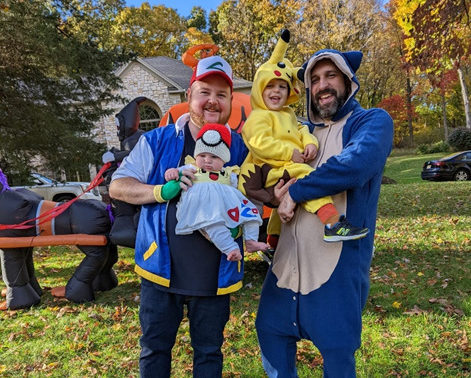
Did you know this month is Pride Month? Parsons’ PRIDE Alliance, one of our six employee business resource groups (EBRGs), will have a variety of activities planned throughout the month, like in-person social events and community outreach, to celebrate tolerance and acceptance of the queer community—and anyone can participate.
Ryan Gabriele, senior vice president and the technical lead for our Defense and Intelligence market, is also the executive sponsor of our PRIDE EBRG. Ryan says what’s so important about having these EBRGs is that they serve to raise awareness, support, and celebration of a community that has been historically disenfranchised. He says, “When you’re part of a community that’s for so long had to be quiet about themselves or not talk about themselves, you almost have to overcompensate and make a big deal about it just to hit neutral, right? Just to be equal to everybody else.”
Ryan shares that coming out at work 15 years ago was scary, but fortunately he was accepted by his colleagues, which made it easier for him to be open and, in a way he hadn’t before, deepen the connection between himself and his coworkers. Once he started living authentically at work, he says, “It became easier for me to encourage other people to talk about it too, because others could see my story, being a senior leader and not being afraid to be open.”
He says that storytelling is also an important aspect of understanding and acceptance. And he believes that Parsons hasn’t shied away from telling the stories of diverse communities to create a more inclusive environment. Ryan mentions the stories shared on our Diversity, Equity, and Inclusion site give insight on the people we work with and the challenges they’ve faced, and our “Let’s Get Awkward” series, an internal campaign, encourages employees to share their diverse backgrounds companywide.
He says, “Many people have someone from the LGBTQ community in their lives, but they may not be able to fully appreciate the adversity that person has encountered or the opportunities that person may have missed just for being themselves. And by sharing personal stories, new allies are born, stereotypes are broken, and people are inspired to speak up and take action when they see discrimination, because now they’re defending someone they know.” An additional benefit of sharing our personal stories, he adds, is that it creates an opportunity to bond with everyone, whether they’re from a community that’s been marginalized or not, which in turn strengthens our Parsons culture and leads to a happier and healthier workplace.

Another thing Parsons offers that’s helped Ryan is our mentorship program, which is open to everyone in the company and pairs employees with someone in a senior position in a different field so they have the benefit of an outsider’s perspective. Ryan says he’s received lots of great advice from his mentor, Ricardo Lorenzo, Parsons CTO, such as how best to approach a new project and how to achieve his career goals. But there was one piece of advice in particular that stands out: His mentor advised him to not take criticism or dismissal from others personally. He told Ryan, “If someone treats you with indifference or is negative to you, remember that that’s their problem, not yours. Your work can speak for itself, and you don’t need to be concerned with anything else.” That’s the same advice Ryan now gives to the people he mentors. He believes our mentorship program is a powerful tool for everyone at every stage of their career because of the opportunity it offers to experience both personal and professional growth.
Of course Ryan’s story isn’t limited to his career. He’s been with his husband, Michael, for 20 years, and they have two kids, ages three and one. Ryan grew up in a little town called West Milford in New Jersey. He’s the oldest of three siblings and spent his childhood playing a ton of sports, including soccer, basketball, tennis, and eventually fencing, for which he ranked top 10 in the state. In high school, he was as passionate about computer science as he was with sports and enrolled in the first-ever computer science course offered at his school.
I fell in love with the idea that in computer science you can literally create anything you want just by typing words into a keyboard. I thought that was such a cool concept. This was almost like the mathematical flip side of writing a story. Just by typing words onto the screen, I could make any picture show up. I could enable people to see and interact with whatever I was imagining.”
And he’s still creating—both inside and outside of work. Like most of us, he discovered a new hobby during COVID: painting miniatures.

A storyteller at heart, painting those miniatures is fulfilling in the same way that programming was, back when he began his career out of college. “I love the idea of kind of building these worlds that I picture in my head and then letting other people experience them. I think it’s similar to somebody who’s writing a book who can envision characters and new worlds. I love allowing other people to experience the story I’m writing in my head.”
That desire to tell stories is one of those shared characteristics that makes us human, and feeling comfortable telling our own stories is something that many of us take for granted. What Ryan reminds us of is that Pride Month is all about recognizing the similarities in each other’s stories, acknowledging the differences, and empowering people to be proud of both.